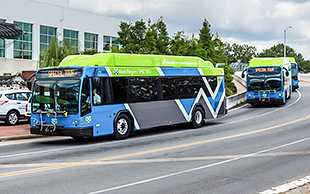Jan. 26, 2016
Arkansas Launches Natural Gas-Powered Buses and Refueling Station
This is a great opportunity for [Rock Region METRO] to continue to meet the needs of our customers with the fleet they deserve. The transition to CNG reflects our commitment to remain environmentally conscious as we enhance our fleet.
When the central Arkansas transit authority, Rock Region METRO (RRM), began to consider switching its fleet to compressed natural gas (CNG), one of its first sources for advice was the Arkansas Clean Cities Coalition (ACCC). Before RRM's board of directors would approve the CNG transition project, they checked with a variety of sources, including ACCC, to ensure that the initial increased costs would be worthwhile. The coalition, backed by the Arkansas Energy Office, helped educate the board about transitioning to CNG and promised its support through the process. The Arkansas Energy Office also provided a $100,000 grant for station infrastructure and equipment, which encouraged funding from RRM's board. This led to the board's approval of the transit authority's alternative fuel vision and the initial purchase of 15 CNG-powered buses.
To prepare for the new buses, ACCC worked with the transit authority to identify contractors who could design, construct, and provide operation and maintenance of a CNG fueling station. "This is a great opportunity for [Rock Region METRO] to continue to meet the needs of our customers with the fleet they deserve," said Jarod Varner, RRM executive director and a strong champion of the alternative fuel project. "The transition to CNG reflects our commitment to remain environmentally conscious as we enhance our fleet."
RRM opened its new CNG refueling station for full-time use in August in tandem with the transit authority's first 15 CNG buses officially hitting the streets. The transit authority estimates that the initial transition to 15 CNG buses will save about $341,838 in fuel costs per year. A plan is also under way to move the entire fleet to CNG within the next 10 years. That transition is likely to save RRM up to $1,264,801 per year. Because the station has the capacity to fuel up to 55 buses in an 8-hour period, service employees can fuel buses overnight instead of during daytime service hours. RRM has also been able to save money due to the lower cost of controlling its own fuel supply. "We strive to provide active support for partners interested in alternative fuels, and we help to connect them with financial resources--whether through a direct grant or innovative financing options," said ACCC Coordinator Patti Springs. "We know this will greatly improve the likelihood that these types of projects will come to fruition."
